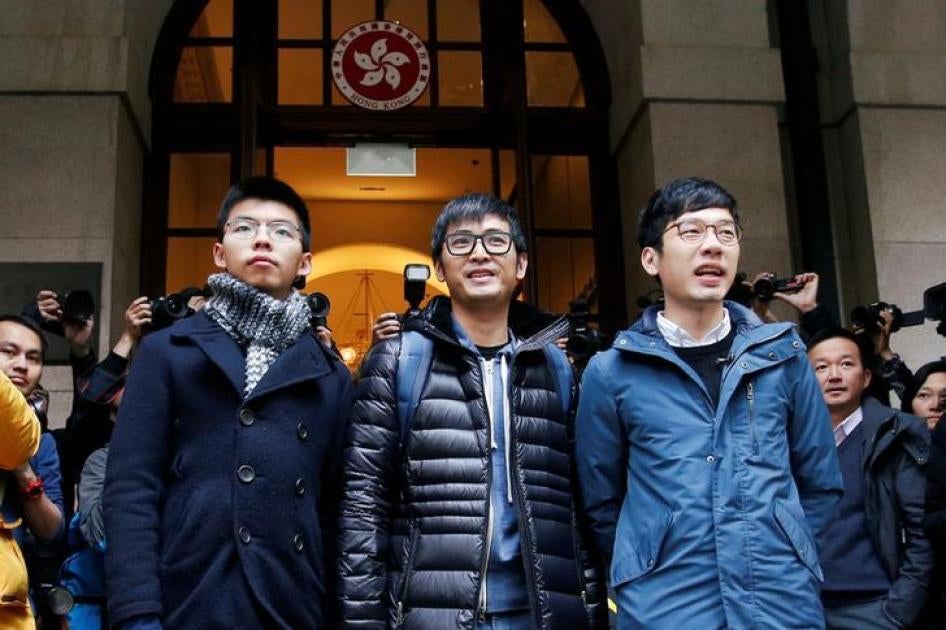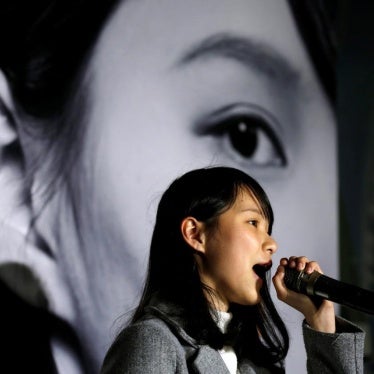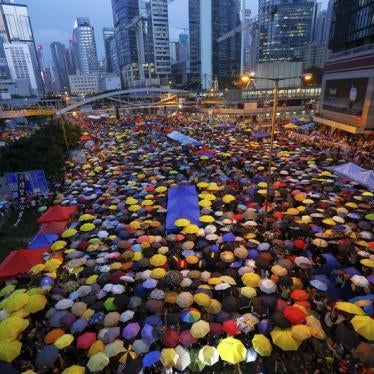(New York) – Hong Kong’s highest court on February 6, 2018, overturned prison sentences imposed by a lower court on three student leaders for their role in a 2014 sit-in that triggered the pro-democracy Umbrella Movement, Human Rights Watch said today. The Court of Final Appeal reinstated a magistrate’s original sentences of already completed community service for Joshua Wong and Nathan Law, and a suspended prison sentence for Alex Chow.
While overturning the sentences, the Court of Final Appeal affirmed the lower court’s role in providing sentencing guidance. As a result, courts in the future will be able to impose longer sentences for the purpose of deterrence in the event of “large scale unlawful assemblies involving violence.”
“The Hong Kong court spared the three student leaders prison time, but the ruling sets the stage for sending future protesters to prison,” said Sophie Richardson, China director. “In light of increasing government efforts to clamp down on those critical of Beijing, this seemingly positive ruling may be remembered as the start of an even larger crackdown.”
The sit-in occurred on September 26, 2014, in Civic Square, a space outside Hong Kong government headquarters. The area had previously been open to the public for protests, but the government sealed it off in 2014 for unspecified “security reasons,” and rejected applications from the student leaders to use it, also for unspecified “security reasons.”
On September 26, protesters pushed the gates and climbed over the fence to enter the square. A number of security guards suffered minor injuries in the chaos. Sixty-one protesters, who sat down peacefully, were arrested on September 27, including Wong, Chow, and Law.
On July 21, 2016, a magistrate’s court convicted the three student leaders, finding that the protesters had “conducted themselves in a disorderly and intimidating manner.” Chow was given a three-week sentence with a one-year suspension, while Wong and Law were given community service orders of 80 hours and 120 hours, respectively. After the Hong Kong Department of Justice won an appeal of their sentences and sought harsher sentences, the Court of Appeal of the High Court on August 17, 2017, sentenced the three to between to six and eight months in prison.
In another court case related to the Umbrella Movement, Wong is currently on bail after being sentenced to three months in prison for contempt of court over his failure to comply with a court injunction to clear one of the protest sites, and thus could still be sent back to prison for his role in the protests.
Hong Kong has a long-standing tradition of tolerating peaceful demonstrations. But since the culmination of the 79-day Umbrella Movement in December 2014, over two dozen pro-democracy leaders have faced court proceedings, some for participating or leading peaceful protests. They face a range of charges, including unlawful assembly, inciting unlawful assembly, inciting public nuisance, conspiracy, obstructing the police, and assaulting a police officer. Some are charged under the Public Order Ordinance, which the United Nations Human Rights Committee has criticized for possibly “facilitat[ing] excessive restrictions” to basic rights.
During this same period, the Beijing and Hong Kong governments have increasingly restricted people’s electoral rights by targeting Hong Kong’s semi-democratic Legislative Council (LegCo). In July 2016, the Hong Kong government added a requirement that candidates running for LegCo have to declare their recognition of Hong Kong as an “inalienable part” of China. It then disqualified two candidates for their pro-independence stance.
Following the 2016 LegCo elections, which a number of outspoken pro-democracy candidates won, Beijing intervened. It issued an “interpretation” of the Basic Law that compelled the Hong Kong courts to disqualify two legislators who explicitly advocated independence for Hong Kong. That court decision later led to the disqualification of four more pro-democracy legislators in 2017.
In January 2018, Hong Kong election officers once again disqualified three candidates running for LegCo, including the Umbrella Movement activist Agnes Chow, who advocated “self-determination.” These disqualifications mean that not a single member of any of the political groups that grew out of the Umbrella Movement – mostly made up of young people – has been able to run for LegCo election or represent voters once elected.
“Hong Kong authorities appear increasingly willing to let previously nonpartisan government institutions do Beijing’s bidding,” Richardson said. “Their tactics and tools may be subtler than Beijing’s, but the net result is to make it harder for those who strongly disagree with Beijing to take leadership roles in politics.”








